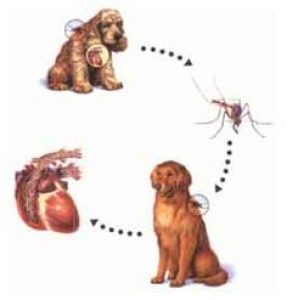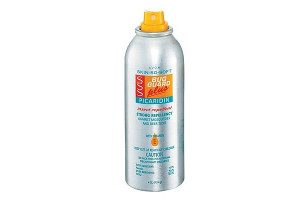Do mosquitoes bite dogs? Though the answer may seem obvious, it’s a question that many pet owners are interested in.
The short answer is yes, mosquitoes will bite dogs, just as they will bite humans. While skeeters might be best-known as being responsible for the lots of human illness around they world, and they have a thirst for dog blood as well. They tend to go for large surface areas such as the back legs and haunches but they can bite anywhere.
Let’s discuss why mosquitoes bite dogs, diseases that dogs can get from skeeters, and how you can keep mosquitoes away from your dog.
Do Mosquitoes Bite Dogs?
Again, yes! Mosquitoes do bite dogs. They can sense the carbon dioxide that animals and humans exhale, which attracts them to their targets. In addition to carbon dioxide, mosquitoes find their targets by picking up on the lactic acid and ammonia in sweat. Mosquitoes bite because they need blood for nourishment and to lay their eggs. if you are in mosquito habitat, they are likely on the lookout for you and your pets — anything with warm blood. So, when a mosquito senses a warm-blooded mammal such as your dog or a human nearby, it will fly toward them and bite.
Diseases Dogs Can Get From Mosquitoes
Just as humans can get illnesses and diseases from mosquito bites, so can dogs. Mosquitoes transmit a variety of diseases that are dangerous to dogs, including heartworm, West Nile virus, canine parvovirus, and canine distemper, and others.
Thankfully, a lot of these diseases are relatively rare compared to those suffered by humans. Nevertheless, if in doubt, always take your dog to the vet who can perform a proper diagnosis and treatment.
Heartworm
Mosquitoes have the potential to transmit a potentially fatal heartworm infection to Fido. When a mosquito carrying infected heartworm larvae bites a dog, it can pass on the disease-causing particles.
This infection settles in the heart and surrounding blood vessels, resulting in serious issues with breathing, tireless coughing, weight loss, and other health concerns.
Heartworm is fairly simple to test for and treat once detected but unfortunately is not always possible to detect until more severe symptoms occur.
Fortunately, there are preventative treatments available that when administered regularly can help keep our furry friends safe from this dangerous infection caused by mosquitoes, so be sure to keep your dog up-to-date on heartworm meds!
West Nile Virus
Dogs can also contract West Nile Virus from mosquitoes. Infected mosquitoes bite a dog, then inject the virus into the bloodstream. It can be a serious health risk for pooches, so it pays to always keep an eye out for symptoms like fever, lethargy, weakness, or loss of appetite.
Fortunately, if your pup is affected, there are effective treatments available. 
Systemic Lupus Erythematosus
While usually limited to humans, recent studies have shown that mosquitoes are capable of transferring this autoimmune disease from humans to our dogs.
This disorder may cause an array of symptoms and clinical signs, including skin ulcerations and photosensitivity, joint pain and lameness, chronic cysts or nodules on the head or ears, high fever, poor blood clotting, fatigue, reduced appetite, and weight loss.
If left untreated or unrecognized by a veterinarian early on, this condition can be life-threatening, so if you suspect your dog has a mosquito-borne illness, get it checked out right away.
Equine Encephalitis
Equine Encephalitis is an inflammation of the brain most commonly associated with horses. This illness can be passed to dogs through mosquitoes as they bite and transmit the virus to our furry family members.
This disease can cause a variety of issues such as seizures and behavioral changes, both of which require veterinary attention. Sadly, in some cases, it may progress to death.
Parvovirus
Canine parvovirus affects a dog’s gastrointestinal tract, and it is spread through contact with infected feces. While parvovirus does not affect humans, it can cause severe diarrhea, vomiting, and even death in dogs. It can cause a variety of symptoms also, including fever, eye inflammation, seizures, and respiratory problems. Of course, these reasons are why it’s best to keep your dog away from mosquitoes to prevent any potential illnesses.
Keeping Mosquitoes Away From Your Dog
Now that you know why mosquitoes bite dogs and the diseases they can transmit, you may be wondering how to keep mosquitoes away from your furry friend. Here are a variety of methods you can choose from or combine together.
Dog-Friendly Mosquito Repellent
There are many dog-friendly mosquito repellents available, so you don’t have to worry about your pet being exposed to dangerous chemicals. Look for products that contain natural ingredients such as citronella, lemongrass, and cedarwood oils. Apply the natural repellent directly to your dog’s fur, making sure you get it all around its body and legs. Avoid applying the repellent on your dog’s face as it could irritate their eyes and nose. Instead, apply the repellent on a cloth and use that to wipe around your dog’s face. Don’t forget about the collar, either! Spraying repellent on a collar will definitely keep those buggers away.
such as citronella, lemongrass, and cedarwood oils. Apply the natural repellent directly to your dog’s fur, making sure you get it all around its body and legs. Avoid applying the repellent on your dog’s face as it could irritate their eyes and nose. Instead, apply the repellent on a cloth and use that to wipe around your dog’s face. Don’t forget about the collar, either! Spraying repellent on a collar will definitely keep those buggers away.
Dog Jackets
Dog jackets are an easy and eco-friendly way to keep mosquitoes away from your pet. Using the previous method we just talked about, you’ll be using mosquito repellent and spraying it directly on the jacket. Then, simply put the jacket on your dog for an added layer of protection and warmth. This method is pretty quick, and you may not even need to apply repellent around the face, tail, and legs if you spray the jacket well. However, if it’s mosquito season or humid outside, applying repellent everywhere may be necessary. You’ll ideally want the jacket to be appropriate for the season, so your dog stays comfortable. Have them wear something light and breathable during warmer or hotter days, and something more insulated and waterproof during colder days.
Clear Standing Water
Mosquitoes breed in standing water, so it’s important to eliminate any potential sources of stagnant water near your dogs. These include places like your backyard, patio, and garden. Check all around your home and see if there are any unknown water sources you may have been unaware of. Any standing water should be cleared away as soon as possible to help keep mosquitoes from breeding in your area. A great way to keep water moving is to place a fountain or pump in the body of water. You should also scoop up the debris that’s laying on top of the water to avoid giving mosquitoes easy surfaces to lay their eggs.
around your home and see if there are any unknown water sources you may have been unaware of. Any standing water should be cleared away as soon as possible to help keep mosquitoes from breeding in your area. A great way to keep water moving is to place a fountain or pump in the body of water. You should also scoop up the debris that’s laying on top of the water to avoid giving mosquitoes easy surfaces to lay their eggs.
If you can’t clear the standing water – perhaps it is a pond you don’t want to drain — at least use dunks and bits to curb the population.
Keeping Your Living Space Mosquito-Free
This one applies to those who don’t want to worry about mosquitoes latching onto their dogs around the home. Keeping mosquitoes out of your house will have benefits for both the humans and the pets. Mosquitoes are typically attracted to dark and humid places, so keeping your living space well-ventilated is a good way to keep them away. You can traps and fumigators to help kill off any mosquitoes that find their way around your home. Mosquito nets are also helpful if your dog is constantly exposed to mosquitoes during the day. Setting up plants like citronella and marigolds is also an effective and simple option to repel mosquitoes.
A more professional way of getting rid of mosquitoes is with a fogger. Mosquito foggers come in smaller cans or a more powerful machine that will spray insecticide in an aerosol form, covering a wide area and killing off any mosquitoes that come intact. It’s important to follow the safety and usage instructions when using these products as they may be dangerous for you and your pet. Foggers are definitely one of the most effective methods of getting rid of mosquitoes!
Plant Some Mosquito-Repelling Plants In Your Yard
Not a cure-all, but one way to perhaps curb the activity of mosquitoes is planting plants known for repelling them. Not only are they aesthetically pleasing, but mosquito-repelling plants double up as natural protectors against the pesky bugs. Of course, you’ll want to keep your dog safe too, so only plant what your dog can safely ingest just in case Fido decides to chew on leaves. 
Some plants you can think about include:
- Catnip
- Basil
- Lavender
- Lemon balm
- Sage
- Mint
- Rosemary
Avoid other mosquito-repelling plants like some geraniums, citronella, pennyroyal, certain marigolds, and garlic that is toxic to dogs.
Be mindful of Where You Travel
When planning your next outdoor adventure with your dog, be sure to keep mosquitoes in mind. Avoid areas with dense vegetation and standing water such as swamps and marshes. These areas are ideal breeding grounds for mosquitoes and will likely have a large number of them in the area. If possible, stick to open and dry spaces where mosquitoes are less likely to exist. If there’s no other way around it, make sure you’ve at least prepared your dog with some of the other solutions we’ve presented. It might also be useful to know that mosquitoes are most active from dusk until dawn, so you may want to keep your dog indoors during these hours.






